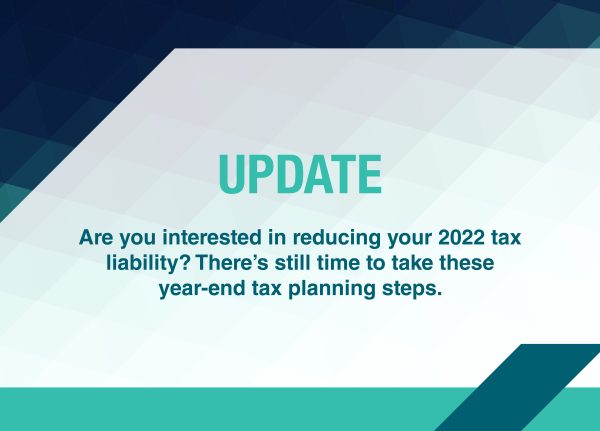The IRS recently finalized regulations that change the eligibility standards for the Affordable Care Act’s (ACA’s) premium tax credit. This is important news if your organization is an applicable large employer (ALE) under the ACA, or will be in 2023, and there’s any chance your health care coverage won’t be considered “affordable” and of “minimum […]
We are so proud that the exceptional dedication and commitment that Michael H. Kane and Michael Kaplan provide to their clients has earned them this honor from Billboard.
It has been quite a year — high inflation, rising interest rates and a bear stock market. While there’s not a lot you can do about any of these financial factors, you may have some control over how your federal tax bill for the year turns out. Here are some strategies to consider executing before […]
Congratulations Denise Berganio Balcazar, CFE on being recognized — again — as one of the Los Angeles Business Journal Women of Influence: Accounting! Denise’s depth of experience, commitment to mentorship, and innovative mindset propels our firm forward every day.
On October 13, the U.S. Department of Labor (DOL) published a proposed rule to revise existing guidance on how to determine whether a worker is an employee or independent contractor under the Fair Labor Standards Act (FLSA). The DOL intends to rescind an earlier rule and replace it with an analysis for determining employee vs. […]
Michael Kaplan, CPA & Justine Grant Ruffalo – your exceptional commitment to your clients is world class and we couldn’t be more proud.
Is your business ready to take its health care benefits to the next level? One way to do so is to supplement group health coverage with an Excepted Benefit Health Reimbursement Arrangement (EBHRA). Here are some pertinent details. Rules to follow Under a traditional HRA, the employer owns and funds the tax-advantaged account up to […]
If you’re interested in investing in tax-free municipal bonds, you may wonder if they’re really free of taxes. While the investment generally provides tax-free interest on the federal (and possibly state) level, there may be tax consequences. Here’s how the rules work. Purchasing a bond If you buy a tax-exempt bond for its face amount, […]
The IRS recently issued its 2023 cost-of-living adjustments for more than 60 tax provisions. With inflation up significantly this year, many amounts increased considerably over 2022 amounts. As you implement 2022 year-end tax planning strategies, be sure to take these 2023 adjustments into account. Also, keep in mind that, under the Tax Cuts and Jobs Act […]
Are you feeling generous at year end? Taxpayers can transfer substantial amounts free of gift taxes to their children or other recipients each year through the proper use of the annual exclusion. The exclusion amount is adjusted for inflation annually, and for 2022, the amount is $16,000. The exclusion covers gifts that an individual makes […]
Business valuation professionals who serve as expert witnesses in court face two daunting tasks: First, they must capture the attention of a judge or jury. Then they need to make complex financial analyses understandable. That’s easier said than done after the trier of fact already has listened to hours of testimony in commercial litigation. Impactful […]
What do you do with your financial statements when your auditor delivers them? Resist the temptation to just file them away — they’re more than an exercise in compliance. With a little finagling, you can calculate key financial ratios from line items in your company’s financial statements. These metrics provide insight into historical trends, potential […]












